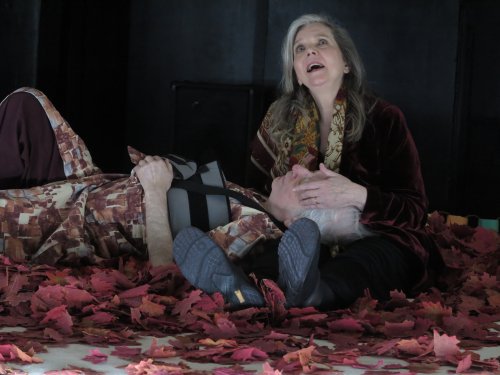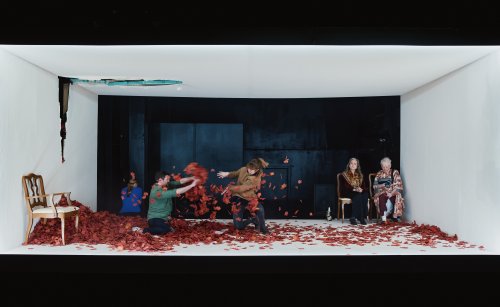The Dark Outside
Austin Pendleton portrays the father in nonagenarian English playwright Bernard Kops’ family secrets drama that’s been given a quirky premiere production.

Austin Pendleton and Katharine Cullison in a scene from the world premiere of Bernard Kops’ “The Dark Outside” now at Theater for a New City (Photo credit: Jonathan Slaff)
[avatar user=”Darryl Reilly” size=”96″ align=”left” ] Darryl Reilly, Critic[/avatar]
The Off-Off-Broadway world premiere of The Dark Outside, nonagenarian English playwright Bernard Kops’ poetic, archetypal and fantastical family secrets drama is problematic. Directorial excess combined with intrusive conceptual design clash with authorial vision. The play was originally performed as a reading at London’s National Portrait Gallery on January 17, 2020. It’s likely that its potential was more realized and faithful to Mr. Kops’ text during that simple event.
Set in London, sometime in the latter 20th century, the Jewish tailor Paul is to celebrate his 60th birthday. This is complicated by the fact that he was recently struck down by a drunk driver near Fortnum & Mason, necessitating the amputation of one of his arms. His stalwart Brooklyn-born wife Helen resourcefully arranges a party attended by their three troubled children, Penny, Ben and Sophie, who range from the ages of 19 to 30.
Kops renders his resonant premise with often dreamy dialogue, his signature device of characters breaking out into popular songs and confessional monologues delivered in the backyard to an unseen tree. There are references to post W.W. II British politics and other native cultural nods such as societal discord. Kops’ accomplished writing is in the British kitchen sink tradition and despite this overly stylized incarnation the play’s power remains evident.
On arrival, the audience is greeted by the sight of scenic designer Walt Spangler’s arresting Stanley Kubrick’s 2001: A Space Odyssey-style white rectangular module floating in darkness. It’s sparsely furnished with vintage chairs, there’s a gaping hole that runs from a wall to the ceiling and a mound of red leaves on the floor. These get a symbolic workout as characters throw them around from time to time. This initial sight is accompanied by a mysterious whirring noise. Is the overbearing sound design the strategy of Nick T. Moore or due to faulty equipment? Mr. Moore’s contemporary recorded piano score is periodically broadcast at such high volume as to drown out the actors.

The company of the world premiere of Bernard Kops’ “The Dark Outside” now at Theater for the New City (Photo credit: Emilio Madrid)
Morning, a living room in a house in London. Paul is alone, dressed in a kimono, sitting on the sofa, playing the mouth organ and singing Woody Guthrie. So, writes Kops in his opening and characteristically basic stage directions. Director Jack F. Serio gives us a weighty preamble reminiscent of a Franco Zeffirelli epic. To the accompaniment of crashing music, the characters appear and are positioned, Paul is dramatically robed with a kimono and fitted with a sling, indicating his missing limb, as if this were a coronation ceremony. Mr. Serio is focused on hollow presentational flourishes, rather than basic concerns for staging a domestic story. Serio adds numerous other extraneous visual tangents not specified by Kops; it’s a case of a theater director as auteur. The play’s pacing is slack and unsteady, resulting in narrative vagary. The jarring lighting design by Keith Parham is akin to this modus operandi with distracting brightness and shadowiness. Costume designer Ricky Reynoso provides worthy everyday wear.
It is always wonderful to witness another late career stage turn by the industrious American acting icon Austin Pendleton who here charms and gets deserved laughs. However, as Paul, the 81-year-old native Ohioan Mr. Pendleton visually and vocally does not at all convey the persona of a 60-year-old English Jew, especially with his familiar unaccented Austin Pendleton speech patterns. Still, he lights up the stage with his noble intrepidness.

Brenna Donahue and Jesse McCormick in a scene from the world premiere of Bernard Kops’ “The Dark Outside” now at Theater for a New City (Photo credit: Jonathan Slaff)
New York actress Katharine Cullison is an acquaintance of Kops, and he wrote the role of Helen for her. Ms. Cullison offers a classic matriarch portrayal, combining tenderness, feistiness and resilience, all into a lovely performance. As the children, Jesse McCormick, Brenna Donahue and Kathleen Simmonds achieve solid characterizations with each shining while enacting their traumatic revelations.
Bernard Kops was born in London on November 28, 1926, to Dutch Jewish immigrants. By the 1960’s, he was an established dramatist, poet, television writer and later an acclaimed memoirist. Such are the vicissitudes of the arts, that Mr. Kops did not attain a notable presence in the New York theater. Though flawed, for many this production of The Dark Outside will be a tantalizing introduction to Kops’ work.
The Dark Outside (through November 28, 2021)
Theater for the New City, 155 First Avenue, in Manhattan
For tickets, visit http://www.thedarkoutsidenyc.com
Running time: one hour and 40 minutes with no intermission






I’m very sorry sir, you have no taste